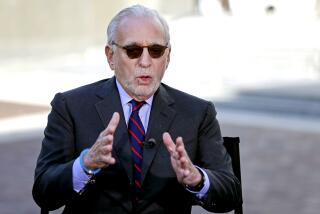Fund Companies Looking for a Timeout
- Share via
A change at the top of the Securities and Exchange Commission is raising mutual fund companies’ hopes for a slowdown in new regulations -- and perhaps a more forgiving view of industry practices that now are under a spotlight.
That worries some investor advocates, who say that the SEC has yet to deal with a number of important questions involving how funds operate and whether shareholders are treated fairly.
The $8-trillion fund industry, which has seen its once-pristine reputation tarnished by a series of scandals over the last two years, is looking to SEC Chairman-designate Christopher Cox for a timeout of sorts.
“Heavy-handed regulation had a time and place but at some point you have to let the marketplace function,” said Perrie M. Weiner, a partner in the Los Angeles office of law firm DLA Piper Rudnick Gray Cary, whose clients include fund companies.
Paul Schott Stevens, president of the Investment Company Institute in Washington, the industry’s chief trade association , said the group believed “there needs to be a period of time to digest” the new rules imposed on fund firms in recent years.
Business groups, including the institute, roundly praised President Bush’s choice of Cox earlier this month to replace William H. Donaldson, who will leave the agency at the end of this week.
Cox, a Republican congressman from Newport Beach, has long advocated a minimalist approach toward government restrictions on business.
The fund industry is hoping that plays to its favor on two levels. One is in terms of potential new regulation. The other is on the issue of SEC enforcement proceedings, and whether the agency should prosecute fund companies for certain long-standing practices that are now under fire -- such as so-called revenue-sharing deals with brokerages that sell funds.
One contentious regulatory issue will get a fresh public airing Wednesday, when Donaldson presides over his last open meeting as SEC chairman.
The SEC a year ago voted 3 to 2 to require fund boards of directors to have independent chairmen, meaning the board chief can’t have ties to the fund company. The new rule was a direct response to the trading scandals that rocked the industry beginning in September 2003, when New York Atty. Gen. Eliot Spitzer uncovered secret deals between fund companies and favored big investors to allow rapid-fire trading that harmed buy-and-hold investors.
Last Tuesday, however, a federal court ordered the SEC to review the independent chairman rule, saying the agency needed to more thoroughly consider the costs the change would impose on the industry.
Donaldson, a Republican who had voted with the commission’s two Democrats to approve the rule -- over the objections of the panel’s other two Republicans -- quickly placed the issue on the agenda for his final meeting this week, raising the prospect of another 3-2 vote.
That has aggravated some in the fund industry who believe the SEC hasn’t had time to do the cost-benefit analysis the court required.
“I don’t see how they could do that in such a short period of time,” Stevens said.
A rushed-through new version of the independent-chairman rule could trigger a backlash, driving the industry to aggressively lobby Cox for an unofficial moratorium on other new regulation, some experts said.
Cox’s office in Washington said he wouldn’t comment on fund issues, pending his confirmation by the Senate.
Some reforms proposed in the wake of the fund trading scandal still are on the SEC’s to-do list. One is whether to effectively require fund firms to set an earlier daily deadline for investors’ buy and sell orders, to limit the potential for after-hours trading violations that were also uncovered by Spitzer’s probe.
“There still are opportunities for abuses,” said Roy Weitz, head of FundAlarm.com, an industry watchdog website in Tarzana.
Another debate is over how much additional disclosure fund companies should make to investors about murkier aspects of their operations, such as the costs incurred in trading stocks. The industry has generally contended that it is overburdened, as is, with disclosure rules.
Besides expecting Cox to go slower in terms of additional regulation, many fund company lawyers are betting that he will be less willing to pursue some enforcement cases the industry has labeled unfair prosecution.
“I can see him putting the brakes on some of the things the staff has been doing,” said Richard Phillips, an expert on mutual fund law at Kirkpatrick & Lockhart Nicholson Graham in San Francisco.
A major case still outstanding is the SEC enforcement division’s investigation of giant American Funds of Los Angeles. The SEC has told the company it expects to charge it with violations related to revenue-sharing payments to brokerages.
American Funds, owned by Capital Group Cos., is fighting similar charges brought by state Atty. Gen. Bill Lockyer and by the NASD, the securities industry’s self-regulatory group formerly known as the National Assn. of Securities Dealers. The company has insisted it has followed all SEC rules regarding revenue-sharing agreements, and that regulators are rewriting history to bring charges of wrongdoing.
The enforcement division must get the commission’s approval to formally bring charges. With time running out on Donaldson’s tenure, it appears the division will wait to bring the American Funds case before a Cox-chaired commission, said several securities lawyers familiar with the case.
That could present a major litmus test of Cox’s willingness to pursue controversial enforcement actions against fund firms.
More to Read
Inside the business of entertainment
The Wide Shot brings you news, analysis and insights on everything from streaming wars to production — and what it all means for the future.
You may occasionally receive promotional content from the Los Angeles Times.










